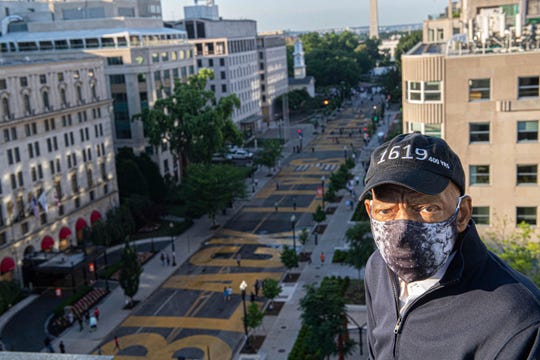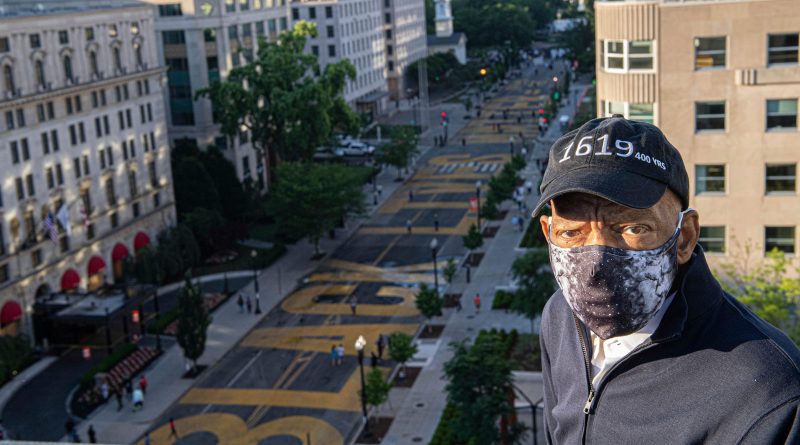John Lewis pledged heart and body to redeem a nation’s soul
[ad_1]
Wintley Phipps performs “Amazing Grace” at a ceremony honoring the life of Rep. John Lewis in the rotunda at the U.S. Capitol.
USA TODAY
In this time of unrest when we talk a lot about Black bodies, particularly the treatment of them by police, it’s important to remember how the civil rights activists of the 1960s used their bodies in service to social protest. Some gave their lives while others risked their lives time and again.
Rep. John Lewis, the Georgia congressman who died July 17 at age 80, didn’t hesitate to put his body on the line.
During Nashville’s 1960 drugstore lunch counter sit-ins, he was pulled off a stool and beaten. As one of the original Freedom Riders in 1961, he was beaten at a Greyhound station in South Carolina, then arrested and jailed when the bus reached Birmingham, Alabama. His beating in 1965 on the Edmund Pettus Bridge in Selma, Alabama, by a state trooper who fractured his skull became the defining image of “Bloody Sunday” and the quest for Black voting rights.
As a congressman, he led annual pilgrimages to the bridge to remind us that for every victory gained, there was more that needed to be done to create the “beloved community” free of poverty, racism and violence that his friend and mentor Martin Luther King Jr.envisioned.
“It must be done because the struggle is not over,” Lewis told former Tennessean opinion writer Dwight Lewis in 1998, about his insistence on leading nonviolent protests. “We have not yet created the beloved community. We have not yet created a truly interracial democracy in the South or in America. So the fight is an ongoing fight, and I have said from the beginning that our struggle is not one that lasts one day, or one month or one year. It is a struggle of a lifetime, and maybe another.”

Rep. John Lewis, in a 1619 hat marking the start of U.S. slavery, looks over Black Lives Matter Plaza in Washington, D.C., on June 7, 2020. (Photo: Khalid Naji-Allah/Executive Office of the Mayor via AP)
John Lewis was the last of the civil rights era’s lions, the small group of Black men and women whose strategy propelled the movement. As Dwight Lewis notes, it may be fitting that he and the Rev. C.T. Vivian, field lieutenant for King and the Southern Christian Leadership Conference who also died July 17, exit at what seems to be the beginning of a new civil rights movement.
More: ‘Giant of a man’: Three former presidents to attend John Lewis’ funeral in Atlanta
More: John Lewis: A final day of tribute in Washington as some lawmakers push to honor legacy with voting rights bill
More: A nation John Lewis helped unite salutes him on his final journey across Selma bridge
Lewis told “CBS This Morning” in June that the Black Lives Matter protests, building in momentum since the 2012 death of Trayvon Martin at the hands of a Florida neighborhood watchman to the death of George Floyd under a Minneapolis police officer’s knee in May, felt very different — larger and more inclusive than other uprisings since the ’60s — and he was hopeful for greater change. “If it becomes necessary to use our bodies to help redeem the soul of a nation, we must do it,” he told Gayle King. His last public appearance was a quiet Sunday morning visit in June to Black Lives Matter Plaza across from the White House.
Lewis spent his life being guardian of the beloved community ideal in his calm authority and focused leadership on and off Capitol Hill. The standard he bore, and the struggle of his lifetime, now passes to another generation.
In USA TODAY’s special commemorative edition we explore the legacy Lewis leaves behind and the road ahead for civil rights.
The issue contains the obit, appreciation, reflections from civil rights veterans and younger activists. essays and memories from Jesse Jackson, Rep. Jim Clyburn, Rep. Terri Sewell, Donna Brazile and Kristen Clarke as well as a beautiful photo essay and his most famous quotes.
The issue is on newsstands until Aug. 25 and can also be ordered online.
Reach Nichelle Smith at nysmith@usatoday.com and Twitter: @NicSmith312
Read or Share this story: https://www.usatoday.com/story/news/2020/07/29/column-john-lewis-pledged-heart-and-body-redeem-nations-soul/5487923002/

